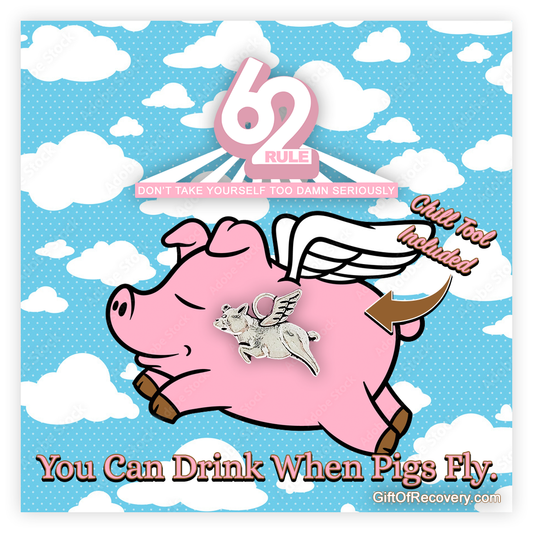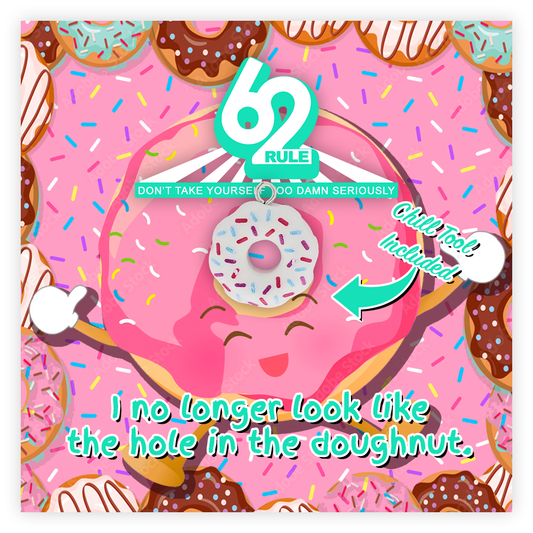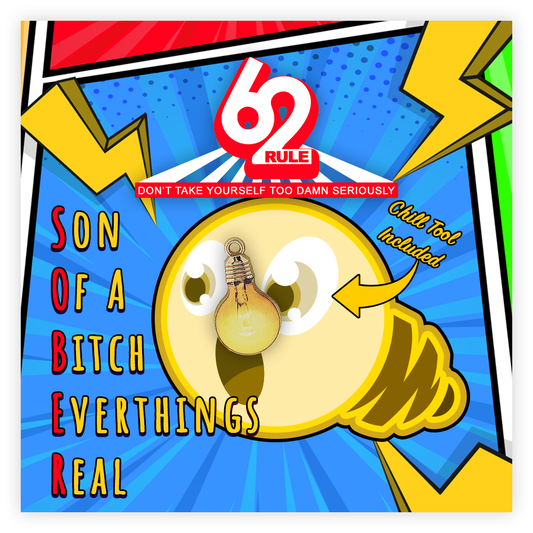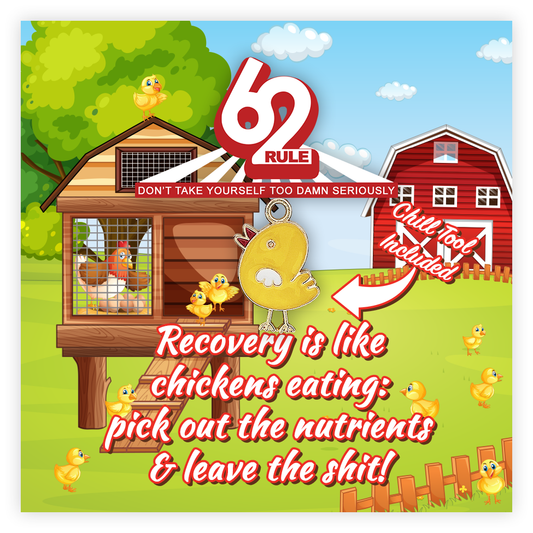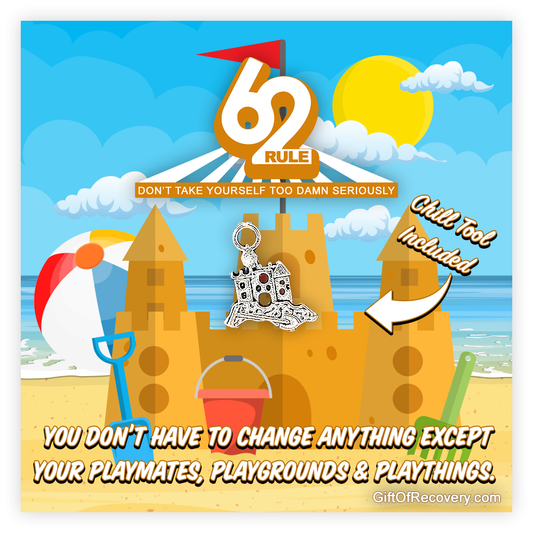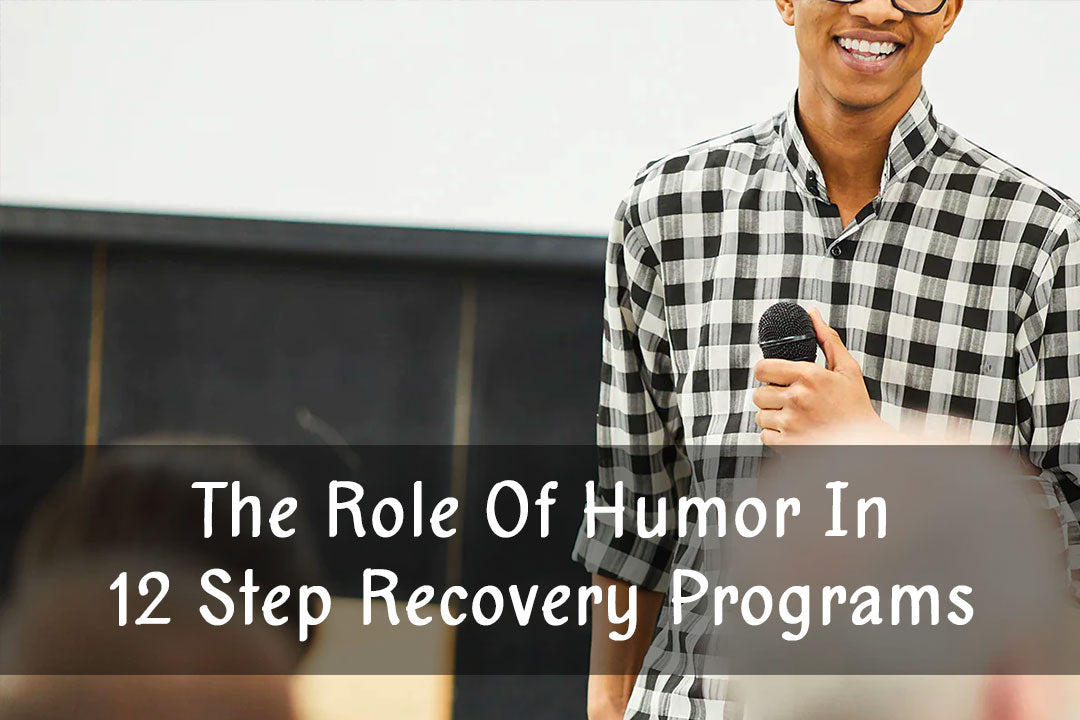
The Role Of Humor In 12 Step Recovery Programs
Share
How can those suffering for years in the darkness and painful struggles of addiction learn they must let go and enjoy life just a little, despite everything? It's possible because of the wisdom shared by those who have traveled the road ahead. The Big Book of Alcoholics Anonymous explains the importance of learning how to laugh and enjoy life this way:
"We have been speaking to you of serious, sometimes tragic things. We have been dealing with alcohol in its worst aspect. But we aren't a glum lot. If newcomers could see no joy or fun in our existence, they wouldn't want it. We absolutely insist on enjoying life (p. 32)."
Yes, recovering from an often life-threatening condition is serious business. Of course, many alcoholics and addicts suffer a great deal. It's hard for them to believe they will ever find joy again. First, they feel hopeless and helpless over their addictions and the compulsive behaviors and troubles their addiction causes. To make it worse, their actions can be selfish, self-centered and off-target. Often problem people living troubled lives, addicts usually take themselves very seriously, sick as they are with worry and negative thinking. As the Big Book counsels in the above quote, a healthy attitude towards living one day at a time requires a lighter touch – it absolutely "insists" that we learn how to enjoy life. Even when struggling – or especially then – clean and sober folks must learn to step back and see what has improved since joining a 12 Step Program. This new way of life means learning a different attitude and focusing on what they have and what they can be grateful for today. As the new person's sponsor would say, being clean and sober belongs at the top of that gratitude list, and then name whatever allows you to enjoy life just for today. Does nothing come to mind? How about the ability to breathe in? Can you see the sky and smell the flowers today? Keep looking. You'll find something, the guide promises.
Don't Take Yourself And Your Problems Too Seriously - Rule 62
A favorite story of the long-timers is about how RULE 62 came about. (Story of Rule 62). In earlier days, a newly clean and sober fellow, a contractor, decided to fashion a 12 Step Program recovery center. He imagined his center in great detail, including everything he could think of which might go wrong in running it. He outlined 61 Rules that members should follow to make it all work. He sent his proposal off to Central Office. Their quick rejection of the proposal confounded him at first. Wasn't his plan perfect enough? But after some sober reflection, he sent back a note that said, "Thanks for the rejection letter! I learned a new rule, let's call it Rule 62: 'Don't take yourself too damn seriously!'" Program members still get a good laugh out of that story.
That's how it goes in 12 Step Recovery programs. There's no long list of rules to follow, but there are guiding principles that really matter if ongoing abstinence is to be achieved. New members who want to make it work must learn how to laugh and have fun – the sooner, the better.
Developing An "Attitude Of Gratitude"
12 Step Recovery programs teach members how to see the irony and humor in many all-too-human character flaws. To one in recovery, the fear and pride, the guilt and shame, and the idiotic, foolish, and sometimes tragic flaws they begin in all honesty to recognize in themselves are shared with others in the rooms. Slowly but surely, they learn to laugh at how life keeps bringing circumstances that challenge them to change and grow. This new outlook on life gives people in recovery a chance to overcome their problems, many of them of their own making, as the Big Book reminds them. Armed with a growing sense of humor and an attitude of gratitude, new 12 Step recovery members find they can endure with laughter many of their problems, clearing away the useless self-pity and self-indulgence that got them into hot water in the first place.
In learning how to live clean and sober, 12 Step Program members go even further. As it says in the Big Book:
"We try not to indulge in cynicism over the state of the nations, nor do we carry the world's troubles on our shoulders. When we see a man sinking into the mire that is alcoholism, we give him first aid and place what we have at his disposal….
So we think cheerfulness and laughter make for usefulness. Outsiders are sometimes shocked when we burst into merriment over a seemingly tragic experience out of the past. But why shouldn't we laugh? We have recovered, and have been given the power to help others (p. 33)."
One Day At A Time
In a wonderful turnabout, over time, addicts and alcoholics come to recognize that they are rarely suited to a cynical attitude. Being cynical, and trusting nothing and nobody, is not a winning stand to take if abstinence, peace of mind and a quiet heart are the goals. Nor should they try shouldering the heavy burdens of the world, at least not while learning how to live without drugs and alcohol. Much practical wisdom can be gained when new members recognize that living simply, one day at a time, is a refreshing and almost necessary way to live. And to find this new way of life, they simply must learn to relax and laugh from time to time. Who can live without having a little fun and finding a little joy?
Anne's Story
When she was 23 years old, Anne T. realized that she might have a little problem with drugs and alcohol. She was constantly over-indulging, waking up with hangovers, and sometimes not remembering how she got home. She began to suspect that her drinking and using weren't normal. But she was so young, she told herself. She was just not ready to quit having fun! She loved parties, dancing and karaoke, and she didn't believe she could enjoy herself without a drink or two to loosen up. A trained dancer, she'd be the life of the party at the hang-outs and clubs she'd begun to frequent. But the drinking and hangovers kept getting worse. After several half-hearted attempts, still thinking FUN was the goal and that FUN could only be found through drugs and drinking, Anne had a moment of clarity. With a little bit of AA in her belly, she began to realize that she had the whole thing backward – the drinking and drugs weren't the FUN part; they were the PROBLEM. Getting wasted was blocking her playful, fun-loving personality. She was struggling to get sober, but drinking was no fun either. What a sad, but clear recognition. In her 12 Step meetings, Anne began anew. She heard the laughter and decided to try harder to listen and learn. She started joining the folks who went to coffee after the meeting, joking and laughing at their own foibles. She soon realized that the laughter and an awakening awareness of similarities to others in meetings were contagious. She was not alone in her struggles. These folks were laughing about the stupid things they'd done and had done to them as if it were all forgivable, all behind them. And she could too! In those early days, she learned that being with others who struggled but laughed anyway while maintaining their sobriety made life more fun. Soon, she was laughing and joking and dancing like her life depended on it. Maybe it did, she realized. Having FUN was really only happening after she quit the drugs and alcohol. Who knew?
A trained dancer, Anne loved to dance. Before she knew it, her sobriety was enhanced even more by going to 12 Step dances with her husband, where they danced the night away. They started giving AA parties, come one, come all from a meeting, to commend their new clean and sober friends when they celebrated anniversaries. They always had fun, and nobody ever got into a fight. Ever. Once, Anne says, at an early evening sober party at their house, the singing karaoke and laughter got so loud that a neighbor called the police. When an officer knocked on the door, Anne invited him in and offered him a soda. The people kept dancing and singing, but a friendly, welcoming atmosphere prevailed. He was astonished. "Nobody's drinking?" he asked. "This is a clean and sober party," Anne assured him. "Join us." The cop said he couldn't, but after looking around for a few minutes, sipping on a soda, he said, "Can you just turn down the bass on that a little bit?" They all had a good laugh, and he left. Anne says having fun is a serious way to help others in 12 Step Recovery. Providing a safe setting to have fun and encouraging young people like she was to "learn the gift of JOY" became a rallying call for Anne. It was her way of giving back. "I've done way more partying sober than I ever did drinking," Anne says proudly because giving the gift of laughter, dancing and joining with other clean and sober folks is the MOST FUN she's ever had.
Like Anne and her friends, clean and sober 12 Step Recovery Program members join together at meetings and learn to have fun, just for the fun of it. Working a good program is serious business, but members learn that taking themselves too seriously is an often-dangerous ego trip. Over the years, program members learn to have fun while celebrating sober anniversaries together and fellowship at 12 Step Recovery Program conventions sponsored regionally and paid for by local members. And through it all, members who learn to find joy in the day and to laugh at themselves live rich lives and find value in helping others to do the same.
Program members laugh first at their own odd character flaws, at their tendency to take themselves and the world around them so very seriously. Like Anne, they learn to look for gratitude and acceptance. "We have recovered," the Big Book says, and this brings new possibilities. Participation in a 12 Step Recovery program fellowship leads to sharing problems, lightening the load, and going with the flow. Many long-timers INSIST on having FUN. Laughter at themselves spills over in 12 Step meetings. FUN itself is contagious, and members find themselves experiencing the simple joys of living. Many members find new joy, new freedom and true happiness by celebrating their in-common struggles and helping each other as they delight in "trudging the path" of sobriety as a community. They share their troubles, have fun dancing and growing together, and stand with each other through thick and thin. "We are not a glum lot" is the call to freedom that addicts and alcoholics live by as they absolutely insist on enjoying life, clean and sober.
Works Cited:
The Big Book of Alcoholics Anonymous, 4th Edition, New York. First Printing, 2001.
Story of Rule 62, Duffysrehab.com, Blog. May 5, 2015.

